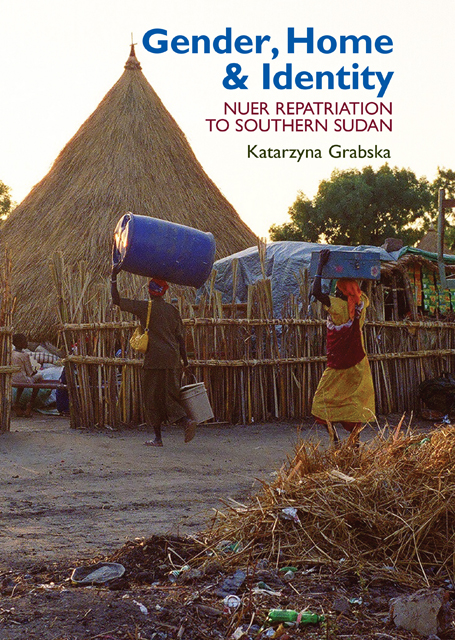Book contents
- Frontmatter
- Contents
- List of Maps and Photographs
- Preface
- Acknowledgements
- Glossary of Nuer Terms
- Acronyms
- 1 Returnee Dilemmas: Dangerous Trousers and Threatening Mini-skirts
- 2 Jiom – Season of Fighting and Running: Conflict, Mobility, Gender
- 3 Mai – Season of Displacement: Becoming ‘Modern’ in Kakuma
- 4 Rwil – Season of ‘Returns’
- 5 Season of Settling-in: Land and Livelihoods
- 6 Tot – Gendered Emplacement Identities, Ideologies and Marriage
- 7 Returnees as Visitors and the Nuer Community: Where Do We Go From Here?
- Epilogue
- Bibliography
- Index
- Eastern African Studies
5 - Season of Settling-in: Land and Livelihoods
Published online by Cambridge University Press: 24 February 2023
- Frontmatter
- Contents
- List of Maps and Photographs
- Preface
- Acknowledgements
- Glossary of Nuer Terms
- Acronyms
- 1 Returnee Dilemmas: Dangerous Trousers and Threatening Mini-skirts
- 2 Jiom – Season of Fighting and Running: Conflict, Mobility, Gender
- 3 Mai – Season of Displacement: Becoming ‘Modern’ in Kakuma
- 4 Rwil – Season of ‘Returns’
- 5 Season of Settling-in: Land and Livelihoods
- 6 Tot – Gendered Emplacement Identities, Ideologies and Marriage
- 7 Returnees as Visitors and the Nuer Community: Where Do We Go From Here?
- Epilogue
- Bibliography
- Index
- Eastern African Studies
Summary
Nyakuol: Becoming Men
When I saw Nyakuol in Lϵr, she told me that Nyapiny, her sister, had given her a hut. She had settled temporarily, having to wait for a survey until the GoSS gave her land. Nyakuol’s family of seven and Nyapiny’s of three shared two small huts. The suitcases Nyakuol had brought from Kenya were piled up in the corner. Her return ‘home’ was difficult:
When we arrived here, there was not much support. The UNHCR took us by plane to Bentiu and then transported us by bus to Lϵr. We were maybe fifty heading for Lϵr. They gave us some food, sorghum, rice, oil and dried beans. That was supposed to last for three months. But when you come home, you have to make gifts to your family and relatives. There are many guests who come to greet you. The food was eaten within a month. Now, the cultivation period is over and we have no food.
At the beginning I was very happy to be back. I was with my family whom I have not seen for over ten years. Now, many of them are also returning to Lϵr. My twin sister who is in Khartoum, I have not seen her since 1983. I wanted to come home to be with my family. But now things are getting difficult. I am very unsettled.
Our life here is hard because we have no money. Now, in Sudan, if you have no money [yiou], you cannot get food. Everything here is about money. Our land is gone and the cows are dead. I have to rely on my family [for support]. I want to first settle down [nyiuuri piny] – to have a permanent land and house – and then I need a job. In Kakuma, I used to work with IRC [International Rescue Committee] as a midwife, and I was a leader of women there. I have all my certificates from courses that I took in Kakuma so this might help me to get a job. I am a widow and I have to rely on myself to provide for the family.
- Type
- Chapter
- Information
- Gender, Home and IdentityNuer Repatriation to Southern Sudan, pp. 126 - 151Publisher: Boydell & BrewerPrint publication year: 2014

